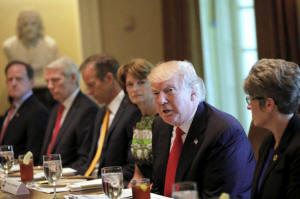|
Supreme Court gives Trump more time to
file travel ban briefs
 Send a link to a friend
Send a link to a friend
 [June 14, 2017]
By Lawrence Hurley [June 14, 2017]
By Lawrence Hurley
WASHINGTON (Reuters) - The U.S. Supreme
Court on Tuesday allowed the Trump administration more time to file
papers responding to an appeals court ruling that upheld a block on a
proposed travel ban on people entering the United States from six
Muslim-majority countries.
The move likely delays any high court action on the administration's two
emergency applications asking for the ban issued on March 6 to
immediately go into effect. The March ban was Trump's second effort to
impose travel restrictions through an executive order.
An entry on the Supreme Court docket said that the administration can
file its new brief on Thursday. Hawaii, which challenged the ban and won
in the appeals court, is permitted to file its own brief on June 20,
meaning the court is unlikely to act on the emergency application until
next week at the earliest.
The court was responding to a request made by Acting Solicitor General
Jeff Wall, who said in a letter that the ruling on Monday by the 9th
U.S. Circuit Court of Appeals in San Francisco means the government
needs to file a new brief.
In an added dramatic twist, Trump himself plans to go to the Supreme
Court on Thursday for the investiture of Justice Neil Gorsuch, an
administration official said. Trump nominated Gorsuch in January.
Gorsuch's confirmation by the U.S. Senate in April restored the court's
5-4 conservative majority.

Trump's visit to the court would be his first since he became president
on Jan. 20 and would put him face-to-face with the nine justices as they
consider the fate of his travel ban unless the court acts before then.
It is common practice for presidents to attend such events, which are
purely ceremonial.
The Supreme Court could discuss how to act on the emergency application
at its private conference on June 22, a week after the Gorsuch ceremony.
Wall wrote that more time was needed because the 9th Circuit ruling in
favor of the state of Hawaii is "the first addressing the executive
order at issue to rest relief on statutory rather than constitutional
grounds."
Hawaii's lawyer, Neal Katyal, filed his own letter objecting to the
government's timeline, although he agreed that both sides needed to file
briefs responding to Monday's ruling.
[to top of second column] |

President Donald Trump attends a lunch meeting with members of
Congress at the Cabinet Room of the White House in Washington, U.S.,
June 13, 2017. REUTERS/Carlos Barria

Federal judges in Maryland and Hawaii blocked Trump's 90-day ban on
travelers from Libya, Iran, Somalia, Sudan, Syria and Yemen. The
Hawaii judge also blocked a 120-day ban on refugees entering the
United States.
The 9th Circuit largely upheld the Hawaii injunction on Monday.
In the second case, the Richmond, Virginia-based 4th U.S. Circuit
Court of Appeals, on May 25 upheld the Maryland judge's ruling.
The lawsuits by Hawaii and the Maryland challengers argued that the
executive order violated federal immigration law and a section of
the Constitution's First Amendment, which prohibits the government
from favoring or disfavoring any particular religion. The Supreme
Court is weighing emergency applications in both cases, but is
likely to act on them together.
Trump's first order on Jan. 27 led to chaos and protests at airports
and in various cities before being blocked by the courts. The second
order was intended to overcome the legal issues posed by the
original ban, but was blocked by judges before it could go into
effect on March 16.
(Reporting by Lawrence Hurley; additional reporting by Steve
Holland; editing by Grant McCool)
[© 2017 Thomson Reuters. All rights
reserved.]
Copyright 2017 Reuters. All rights reserved. This material may not be published,
broadcast, rewritten or redistributed.
 |